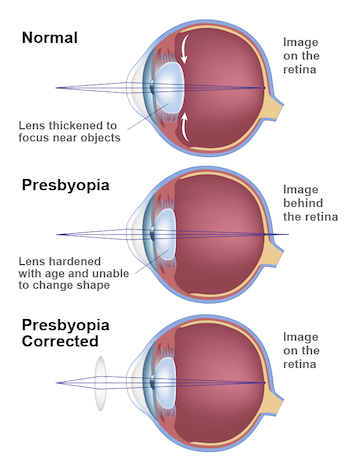Presbyopia Treatment Options
At Montgomery Eye Care, we know that all of our middle-aged patients will eventually struggle with near vision loss due to presbyopia. We also know that each patient’s vision needs and lifestyles are unique, so their presbyopia treatment plans also need to be unique. This is why we offer multiple treatment options for patients with presbyopia, including:
Refractive Lens Exchange
Refractive Lens Exchange, or RLE, is a procedure to replace the eye’s lens with an advanced artificial intraocular lens (IOL). The surgical technique is similar to cataract surgery and patients who have either procedure at Montgomery Eye Care will work with Dr. Montgomery to choose from a wide selection of premium IOLs that can improve eyesight at multiple ranges of vision for less dependence on glasses or contacts.
By replacing the entire lens of the eye, Dr. Montgomery is able to treat presbyopia permanently. The entire lens of the eye is replaced during refractive lens exchange, eliminating the likelihood of developing cataracts in the future.
Learn More About Refractive Lens Exchange
At Montgomery Eye Care, we offer a wide selection of intraocular lens options that can treat vision at one or all ranges to meet each patient’s specific vision needs.
Learn More About IOL Options
Monovision Refractive Surgery
Refractive surgery, including LASIK, PRK, or RLE, with monovision is also an option for patients who wish to improve near vision loss caused by presbyopia. Using monovision or blended vision, Dr. Montgomery can correct one eye for intermediate or close vision while correcting the other eye for distance vision. The brain can combine images from both eyes, producing clearer vision at a wide range. For some patients, it’s difficult to adjust to monovision. To help patients determine if monovision is the right solution for them, we often recommend a trial period with contact lenses before the surgery is scheduled.
Eyeglasses
For patients who aren’t ready to have surgery to treat presbyopia, bifocals or reading glasses may be the way to go. Our optometrist, Dr. Ryan Dugan, can evaluate patients’ vision to help them find the best solution.
Contact Lenses
Contact lenses may also be a good option for patients with presbyopia. Some patients may also benefit from monovision contact lenses, where one eye is corrected for near or intermediate vision and the other is corrected for distance vision. Multifocal contacts are also available.










